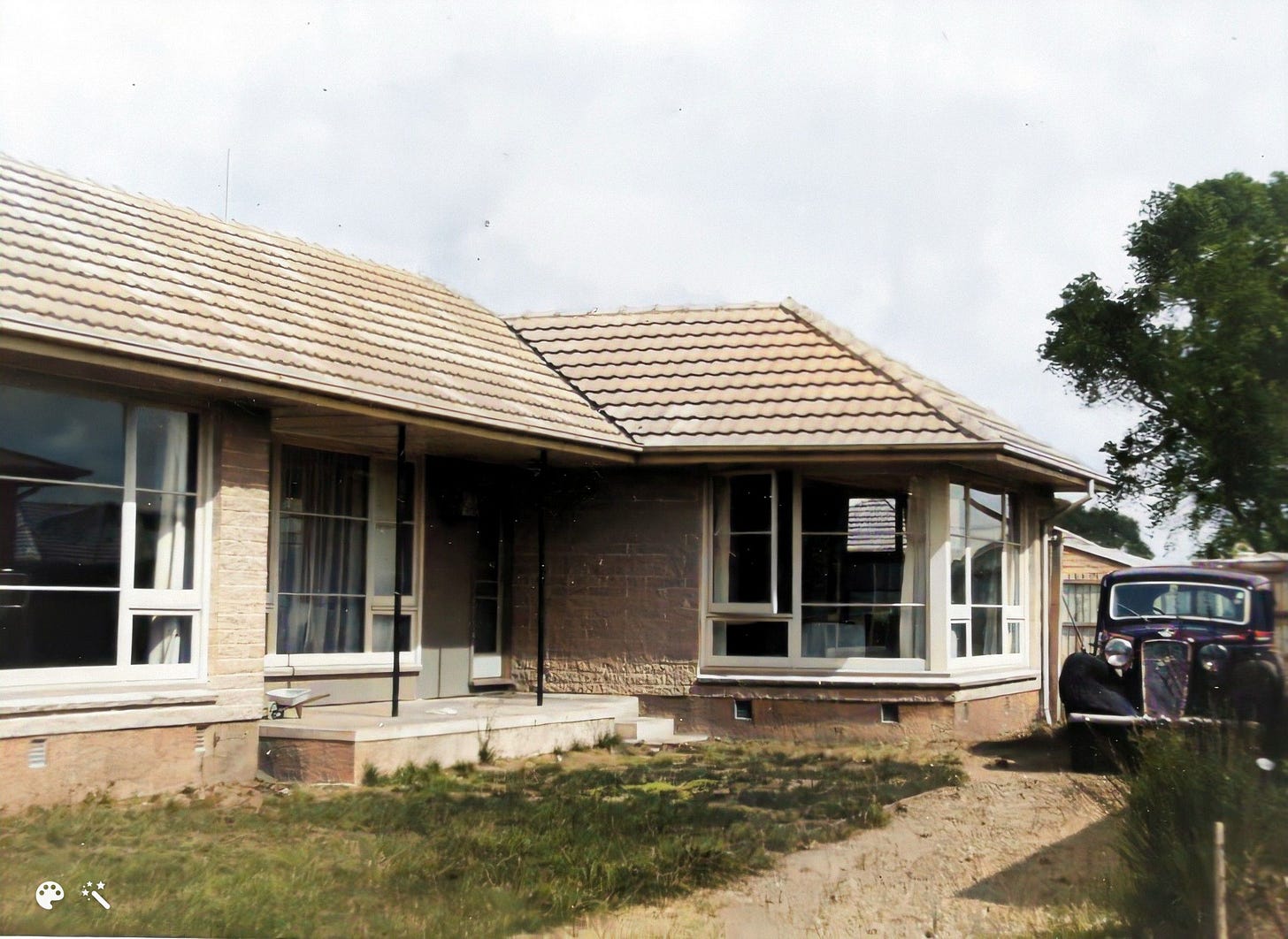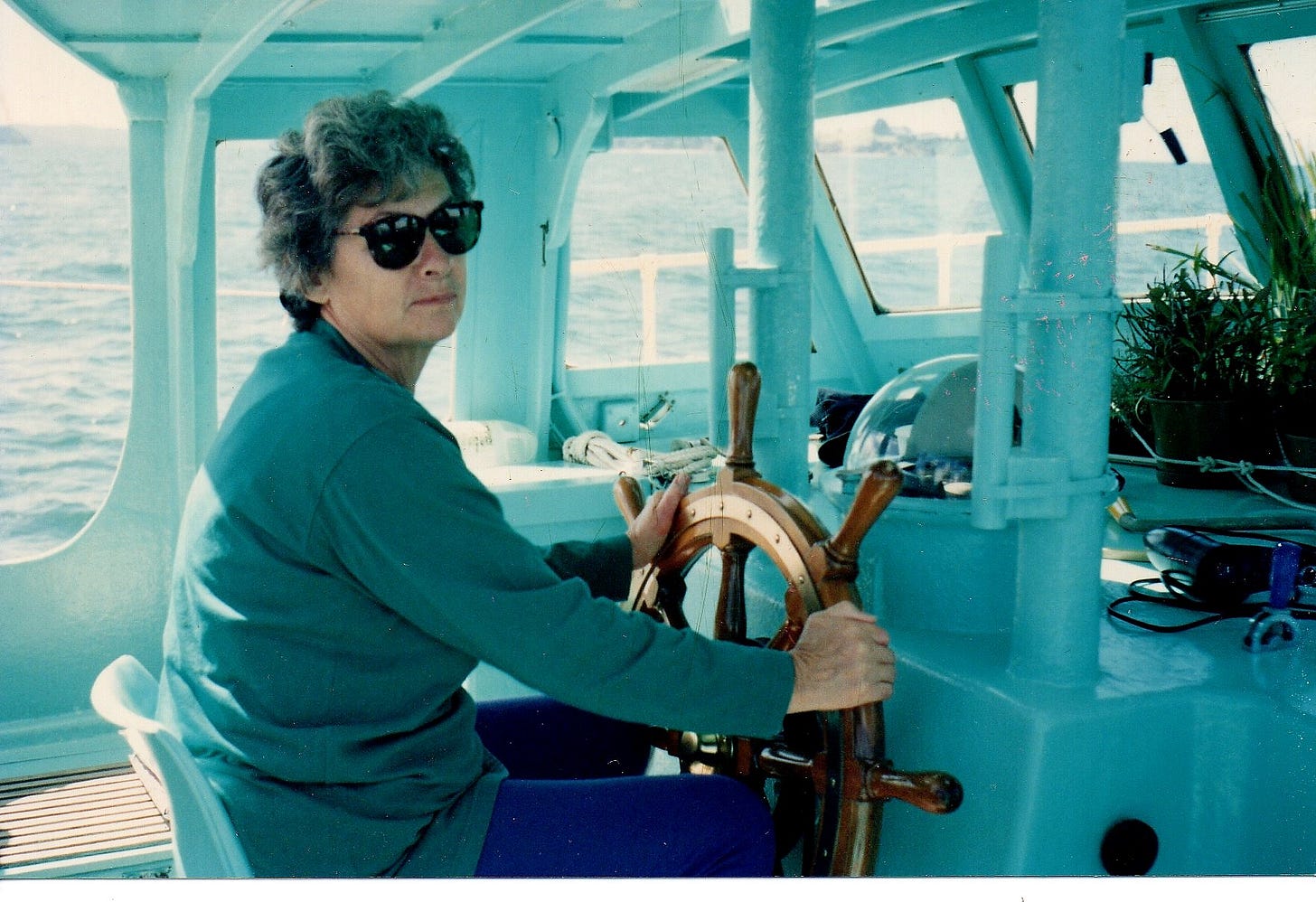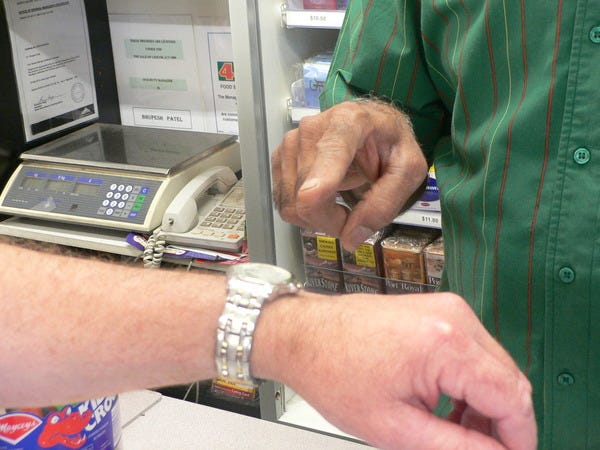My mother never drove a car. Well, just once. The story goes that my father gave her one driving lesson, not long after we immigrated to New Zealand. We were living in Christchurch and the car was an old Austin. You would have had to double the clutch (Google it if you are too young to know what I’m talking about), so my mother would have been going pretty slow. I doubt she would have gotten out of second gear.
Apparently, my father said something about a garage they were driving past, and my mother looked at it and turned the wheel in its direction. If my father hadn’t tried to rip the handbrake out of the floor and turned the key off, he reckoned they would have entered it, but not through the garage door.
That was her last ever driving lesson. If you ask me, my father had trust issues and never wanted my mother to have any thoughts of independence. Immigrating to New Zealand happened in a big hurry, when I was still in nappies, and they arrived in New Zealand with a suitcase and about 10 pounds. He kept my mother under his thumb and I think he liked the fact that she couldn’t drive, and therefore going anywhere without him, wasn’t going to be easy.
Ironically he mellowed later in life and she was allowed on the wheel of our ketch on occasion.
Don’t worry, this is leading somewhere. A lot of the time we lived close to a dairy or grocery store and the local butcher shop, so she could walk home with her groceries. Fridges were fairly small, so you went often, rather than doing a big shop once or twice a fortnight, as we do now.
When we lived in Titirangi the roads were steep and sometimes my mother would go to the phone box and call the local taxi company to drive her home with her groceries. Titirangi Taxis consisted of two cars and she knew the drivers by name. Unlike today’s taxis, they were quite happy to drive her 1-2 km trip home. Sometimes they would even carry the groceries up to the house for her.
Our first phone ever, was when we lived at 1A View Rd, Titirangi, in Auckland’s rainforest in the late 60s.
I wasn’t much interested in the telephone in those days, but well aware of it. We had a party line. Our number was 503M which was 2 long rings and our neighbors, the Budgens were 503R, which was short - long - short. I would answer it if it kept ringing and there was nobody else around, but it was never for me. I might have to write a message. I still remember running between our house and the neighbors to put a message on their doorstep. That was our version of voice-mail.
As kids, we were hardly ever inside. We had the bush, loads of fruit trees, and a decent-sized section. When a phone rang we would listen for the ringtone, and if it was the neighbor’s phone and they were outside, we would yell out to them, if we thought they didn’t hear it. Quite a few people had extension bells for their landline phones.
This reminds me of a one-hit-wonder song from 1977 by Meri Wilson called Telephone Man. Do you remember it? It was a fun song with a bit of innuendo. I wonder what became of her. Maybe she’s still on the phone….
Life couldn’t have been more different in the 1970s from what it is today, and while what we have today was predicted by Science Fiction writers and inventors of the 60s, the idea of mobile phones that showed video just wasn’t something that anyone considered, other than the Jetsons.
In 1970, as a kid, I got to visit the Evoluon, in Eindhoven in the Netherlands. It was like a futuristic museum of technology made by Philips. When we walked in we could pick up a box with a headset, choose from a range of languages, and by selecting a number, we would get audio information about each exhibit. I chose English of course, I thought it would look cool to ask for the English one in Holland.
An exhibit I will never forget was a video phone. Remember, this was 1970. I pushed a button and had a brief chat with a total stranger in a different wing of the building, and could see them, as they answered me on a black-and-white screen.
The theory in the world of telecommunications in the 70s and 80s was that this invention never went anywhere, and wouldn’t in the future, because no woman would answer the phone unless she had her make-up on. This was the fatal flaw. Don’t shoot me. That was the common wisdom of the day.
Something I learned the hard way over the years, was that people had to be ready for the technology. If they weren’t it didn’t matter how clever innovation was. The Gartner Hype Cycle wasn’t even a thing until 1995.
Things just happened a lot more slowly back then.
So there was the home phone, and the business phone, and if you didn’t want to be overheard at home, or needed to communicate when you were not at home, there was the phone box. Eventually, as we started to develop rudimentary data over mobile, with the advent of payment technology, we got rid of the coin slot, which required Post Office staff, to travel around a town or city, to collect coins out of the phone box, and coins were replaced with a telephone card. A job that used to be common, disappeared from sight, and recent generations wouldn’t even know people did that back in the day.
My song, Telephone Card came from a mixture of experiences relating to the phone booths. Not so much the cards themselves. I collected a few cards as souvenirs, but hardly ever used a phone box.
When I lived in Titirangi, the bus service was not great. They were few and far between. Once in a blue moon, before I left home at 16, I would have to ring my father to come and pick me up, because I missed the last bus from town.
Anyway, thinking about telephone cards, I came up with a fun idea. A story if you will, about a guy who needed to get home, but had no money to call a cab or even buy a telephone card. In the story, I go to the local dairy (what we call a corner store or milk bar in New Zealand) and ask Mr Patel to lend me the money for a $2 telephone card. To find out what happens next you will have to listen to the song.
I wanted to make a fun video to go with the song, something I haven’t done yet. But I went to the local store, and spoke with Mahesh, the owner, and asked if I could take a couple of photos with him to go to the story. A high percentage of these stores in New Zealand are owned by Indian families. They are part of the community and know everyone’s business, in a nice way. Ironically after I took the photos, having explained the song to him, I found out that his surname was in fact Patel. I only chose it because it is a common Indian name, at least where I live.
So I got a photo of him pointing at my Seiko watch and saying that if I gave him my watch, he would lend me a $2 telephone card.
You can't buy food with a telephone card Just some borrowed time on the telephone line At 20 cents a minute, how many words can you get in Before you're talking to yourself









